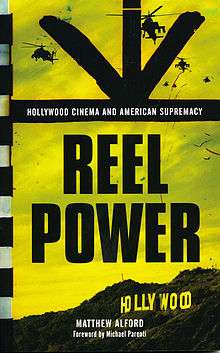Reel Power: Hollywood Cinema and American Supremacy
 First edition, worldwide | |
| Author | Matthew Alford |
|---|---|
| Country | United Kingdom |
| Language | English, Chinese, French |
| Published |
September 2010 Pluto Press (English) March 2013 (Chinese) |
| Pages | 218 (paperback) |
| ISBN | 978-0-7453-2982-6 (UK) |
Reel Power: Hollywood Cinema and American Supremacy is a 2010 Pluto Press book by Matthew Alford, which identifies a group of films that endorse American Exceptionalism as "national security cinema", and argues that even many of the most critical films, such as Hotel Rwanda, Thirteen Days and Three Kings, provide favourable mythology for the United States' government. Alford draws attention to the power of corporate moguls and the role of the Pentagon and CIA in the production of various films, such as Black Hawk Down, Terminator Salvation, and Transformers. The foreword is written by Michael Parenti.
Reception
In the British Morning Star, James Walsh commented that the book "is an engaging look at the innards of the dream factory process" and that although the revelations of film-maker collusion with the Pentagon are not surprising "the details are fascinating" especially in relation to "films traditionally considered nuanced or critical of US foreign policy".[1]
The Journal of Popular Culture called it "One part cultural studies analysis, and another part expose", adding that it "offers a salient critique for those who are concerned about the long term implications of the power of film to act as site of ideological instruction".[2] Contemporary Sociology called it "an attractive and up-to-date set of tools for the critical literacy that should be mandatory in today’s media-saturated environments".[3] Simon Kinnear from Total Film gave Reel Power four stars out of five and called it a "laudable study" and "an eye opening expose". "Alford's occasionally guilty of straw-clutching", he said, "but you'll watch the next gung-ho blockbuster a little closer".[4] In Lobster Magazine, Robin Ramsay observes that "If Alford isn’t quite describing the corporations and the state running joint psy-ops, it will do until joint psy-ops come along". Ramsay reviews the book as "competently done, decently written and, if you’ve seen a lot of American movies – and I have – it is interesting to have the ideological content articulated. I could do it myself, and I’m sort of subliminally aware of it; but most of the time I’m just watching the movie. So the author’s considerable efforts are both useful and entertaining"[5]
Criticisms
Roy Stafford, former editor of In the Picture magazine, says that Reel Power is a "solid introduction" to Hollywood and American politics but one which is a journalistic popularisation of Alford's more overtly academic work and as such, he implies unfortunately, "renders much that Film Studies has tried to do over the last fifty years... as effectively wasted effort."[6]
In The Scotsman, Hannah McGill, artistic director of the Edinburgh International Film Festival opined that Reel Power "has its valid points to make [and] is at its best when it identifies and analyses cases of direct influence being brought to bear on film production by the US political establishment [...] its stonewalling of more contentious projects [...] or individuals in positions of constant influence" but that "I felt, on frequent occasion, as if I was in the company of the character Jane Horrocks played in Mike Leigh's Life is Sweet: the moodily self-righteous teen who hurled the word "FASCIST!" at anyone who failed to mirror her every conviction and desire" [7]
References
- ↑ James Walsh Review: Reel Power, Morning Star, 9 November 2010
- ↑ Journal of Popular Culture Volume 45, Number 4 (August 2012), p. 908-10
- ↑ Contemporary Sociology: A Journal of Reviews July 2011 vol. 40 no. 4 501
- ↑ Simon Kinnear "Reel Power: Book Review", Total Film, December 2010, p.160
- ↑ Robin Ramsay Book Review: Reel Power, Lobster, Winter 2010, pp. 148-150
- ↑ Roy Stafford Book Review: The Case for Global Film, 15 October 2010
- ↑ Book Review: Reel Power, The Scotsman, 9 October 2010